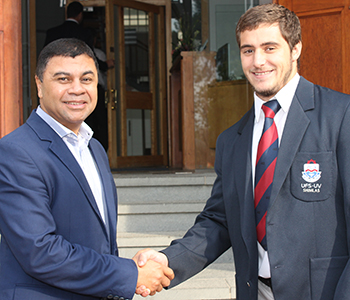
Prof Francis Petersen, Vice-Chancellor and Rector, with
Shimla captain, Stephan Janse van Rensburg, in front of
the Main Building.
Photo: Rulanzen Martin
“I studied at Maties and worked for quite a long time at the University of Cape Town so I am also an Ikey, but now I am a Kovsie. So I am obviously supporting and fully behind the Kovsie team.”
This was what the new University of the Free State Vice-Chancellor and Rector, Prof Francis Petersen, said to the Shimla rugby team at a breakfast on 7 April 2017. The Varsity Cup team was invited to the Main Building by Prof Petersen to congratulate them on a great season. The Rector also thanked the team’s management. “All of them wanted to see you and we have waited quite a few months for you. And thank you for the invite. It means a lot us,” said Jaco Swanepoel, Shimla assistant coach.
Shimlas went in as underdogs
“I was completely stunned by the way you played on Monday night,” Prof Petersen said.
A young Shimlas team went into the tournament as underdogs, but managed to reach the Varsity Cup semifinal against Tuks on 3 April 2017 in Pretoria. The Shimlas staged a great comeback and pushed the home team until the end. They only lost 21-28 against a strong University of Pretoria team.
The Rector also reiterated the importance of sport within the university. “Sport is a unifier and we should use it more to unite.”
Great privilege to meet the new Rector
“It is a massive privilege for our team to be invited by Prof Petersen for a nice breakfast. To know that we have his support, as well as that of the entire university, means a lot to us,” said Stephan Janse van Rensburg, Shimla captain.
The Shimlas wanted to make UFS proud by making a difference and it showed during the semi-final. “We played under extreme pressure and went into the semi-finals as complete underdogs. We played for every Kovsie but unfortunately it didn’t go our way,” Stephan said.